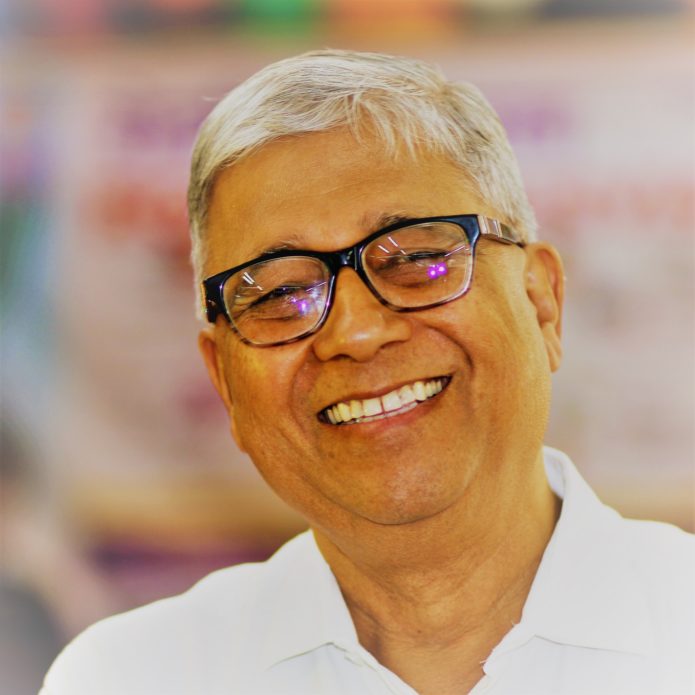Vivek Patwardhan is a quintessential gentelman who through his life, exemplifies the phrase ‘a man for all seasons’! In a quiet, unassuming yet definitive way. He has been that way since the time I met him first.
Let me spare you the effort of looking up “A man for all seasons”. While it stands for someone who is talented and successful in many areas, the origin of the phrase interests me. Robert Whittington, wrote this of Thomas More in 1520
“More is a man of an angel’s wit and singular learning. I know not his fellow. For where is the man of that gentleness, lowliness and affability? And, as time requireth, a man of marvelous mirth and pastimes, and sometime of as sad gravity. A man for all seasons.”
[ From that line comes the famous play (& a much awarded moved later on) on Thomas Moore, bearing the title : “A Man For All Seasons”].
Vivek Patwardhan has been many things to me over the years. I won’t write them all down here for the words do not do justice to the depth of what it means to me. Besides, this post is not about me. It is about a book Lulu Duologues. His book.
Lulu Duologues
Vivek has been an intrepid blogger (amongst other things) for several years now. Sometime in his blogging journey, Lulu started chirping in. The delightful chirping brough gave voice to silent thoughts and unvoiced questions that dont surface in regular conversation. And in doing so, Lulu has been a treat to look forward to and a treasure to cherish.
Lulu has been chirping away for 11 years now. I was more than delighted when a book emerged. A compilation of all Lulu blogposts over several years. (Re)Reading them brought both nostalgia and new perspective.
As I read the book, I realised that most events are transitory. The questions that such events evoke stay for far longer. I must say that this book has held insight way beyond its easy chirping.
I will be chatting more with Vivek Patwardhan over the next few weeks and bringing alive new insights. As a starter, I dropped a few questions into his inbox and the responses came faster than the speed of light.
Here they are. My questions. And answers. from the man for all seasons. By the way, here’s something that I wrote about him in 2009
What propels you to write and share? It is not easy to do it on such a sustainable basis?
I always wanted to write. But there were no opportunities in school where one could do it. When I enrolled for the science college, I had moved from Marathi medium of instruction to English. The college required us to attend tutorials in English. The tutor often praised me and appreciated my writing. She used to give assignments in creative writing. I used to cringe at the praise because I knew my English was poor. I mentioned it to her often. But the tutor often told me not to think of the grammar and focus on the story.
When I started editing the Company’s Marathi magazine, I had no choice but to write regularly. A few of my editorials and articles earned appreciation. The highest point of appreciation came when Dr Narendra Dabholkar (Read about him here ) called up to ask my consent to publish my article, originally published in Company’s magazine, in ‘Sadhana’ a highly reputed Marathi magazine. (I do not know whether my article actually got published, perhaps not, because another commercial magazine published it, probably before Sadhana!). Mr Suneel Karnik, who is a renowned editor of Marathi books has encouraged me time and again, and he still does!
As I moved to a new role in the company, international travel became frequent. So I wrote travelogues some of which were published by Marathi magazines. At the Rotary Club I was asked to interview and write short introduction of members. I found life story of each one interesting; the exercise gave me tremendous insights in how people handle success, conflicts and relationships in general. There was so much to think and write about. I must have read more than twenty biographies as my interest in the lives of people developed.
Experiences, our own as well as those of others, become food for thought. When I wrote, some were reflected in my writing. It is difficult to say how or which got reflected, but I know that the source of my writing was people, their relationship with self and others, and the way their lives were shaped by their relationships with the world.
I worked in Human Resource Management arena. You see how people behave individually and collectively.
I began to see so much drama in all events. Real life is unimaginably different and stranger than fiction. Art is imitating life, as they say, but not adequately enough. Let me tell you what I discovered last month. Please recall the scene in the movie Sholay. Gabbar Singh asks Hema Malini to dance over broken glass splinters and threatens to shoot Dharmendra is she stops. Now here is the true story of Dr Edith Eger. In 1944 she was a 16 years old ballerina and was sent to Auschwitz – she was a jew. She underwent terrible experiences, one of which was that she was made to dance for Josef Mengele.( Read about him here ). He was called the angel of death, he performed deadly experiments on the prisoners of Auschwitz. And Edith survived the holocaust, went to USA and became a very well-known psychiatrist. I am reading her book ‘The Choice.’
I am amazed at the people’s ability to engage in actions of extreme cruelty; and I am also amazed at people’s ability – which Edith demonstrated – to make a life-positive or life-assertive choice.
All this becomes the material from which some thoughts emerge for writing.
Now the next part of the question: you said, ‘It is not easy to do it on such a sustainable basis.’
You introduced me to blogging and that was in 2008. Blogging permits you to do ‘Self-Publishing’. You can write whatever you wish and publish it at will, of course, as long as it conforms to certain norms of writing and publishing. I retired in mid – 2009. In that one year, I realised the full power of blogging.So much so that I had five blogs running at one stage – one for my English blogs, one for HR related blogs, one on which we wrote limericks, one was a photoblog and one on which my Marathi articles were published.
If you put together all the work, and exclude Photo blogposts, I have published more than 1500 blog posts! That works out to one every three days! The count of Lulu blogs alone comes close to 200.
Coming back to what propels me to write and share? I write as I introspect. Writing is my way of introspection. I have been writing ‘morning pages’ for twelve or thirteen years. Writing is helps me take an objective view of an event or experience. And sometimes the pen takes over and writes something which you had no thought at a conscious level! Those can be epiphanies. Though it happens only once in a while, I have got ‘addicted’ to it. The probability of finding some deep meaning in an event or experience is higher than finding a diamond in a mine!
What have been some moments that stay in memory with Lulu, over the years. (When did you start out, how many have you got so far, what’s the best public response, what were you surprised by, what has not been so nice etc)?
The first Lulu blog I wrote in May 2009, on the verge of my retirement. At that juncture you look back on your life. My mother’s death, it was a euthanasia, has stayed on my mind. Time may have blunted the pain a little bit, but it still remains a bleeding wound.
I was copying Behram Contractor (Busybee who published a daily column ‘Round and About’ in The Evening News of India and then in The Afternoon Courier and Despatch)in style.) He used to speak to his dog Bolshoi. Yet Lulu was not invented. And then one day I started writing blogs as dialogues with Lulu, my parrot.
I was also inspired by VishramBedekar’s autobiography ‘Ek Zad ani Don Pakshi’. He refers to shlokas in Mundaka Upanishad, the meaning of which [as explained by Bedekar] is that two birds are perched on the tree of life. One eats the sweet fruits but is sad and weak, and the other does not eat anything but he is strong and analyzing looking at the first one. Bedekar’sautobiography is written as if the second bird is talking about the author, in other words, it is written as a third person account of the author’s life, with his thoughts and reflections on the events in his life. That was certainly another source of inspiration.
Public response has been interesting and varied. At our HR group meetings people often asked about Lulu. Some referred to me as the creator of Lulu. And believe it or not, many persons actually asked me if I kept a parrot as a pet!
I also discovered that people enjoyed a conversation or a dialogue more than an article. Perhaps they imagine they are also a party depending which side of the issue they are, or quite simply they are amused.
I have always found this interesting. For fifteen years, I travelled by Mumbai’s ‘local’ trains. The journey would take at least forty minutes, sometimes longer. I used to observe people. The number of persons who eavesdrop on the discussion between two unknown persons is shockingly high! They usually do not interrupt, but you can see the reaction on their faces when a joke or story is told.
This may be not a very respectful to my readers, but all of us like to eavesdrop on conversations. That could be a reason why a blog in conversation form is more attractive!
About criticism, many friends told me that I ‘reveal’ too much. The ‘Mother’s Day” blog, another one about my reaction when my father was leaving for hospital are some blogs where they felt so. But I write for ‘Svant-Sukhay’ as they say in Sanskrit, or my own pleasure. I feel deeply held emotions should be expressed to lighten your soul, and writing is my way.
When I published Experience and Explanation in which I mention my surprise at the surreal experience of my wife, I thought I was trading a thin line of public acceptance. It was a true experience. My wife comes from a very orthodox Brahmin family and you don’t expect her to be touched by some power in a durgah! But it happened!! I am sure it must have happened to many, but when it comes to Hindu-Muslim terrain, it takes a political turn in our country. Surprisingly nothing like that happened. A friend who is a celebrity and a devout Muslim actually appreciated and said he would discuss such experiences with me when we meet.
There is a child in me which tests the acceptable levels of boundaries of any subject. I have done it in the case of Kasab too, but not in Lulu format. What I have learnt is that individually people of all religions are magnanimous and to a large extent inclusive. But things change dramatically when they make a group!
As I mentioned earlier, I have written almost 200 Lulu blogs, and there is enough to write about.
If Lulu was to come in front of you, what would it say? What would you say?
Lulu is my alter ego, so in a way it will be like looking in the mirror. ‘Mirror Gazing’ as they call it. When we look into the mirror we rarely look in to our eyes. We see our dress, our appearance. Looking in to one’s eyes is not easy; it can be discomforting. It requires self-acceptance. Meeting Lulu will test my self-acceptance. You are asking me what would I say if I meet Lulu. I may not say anything, I may not even challenge his statements, yet it can be a disturbing and yet a revealing meeting.
In my blog on my mother, he accuses me of being a hypocrite giving ‘being busy’ as a reason for not meeting my mother often. In my blog on my father,Lulu accuses me of ‘not being authentic’ in interacting with him. I am unable to refute those allegations. Meeting Lulu is unnerving, yet cathartic!
What would you tell the average Lulu Reader about how to read the book. Especially so, because it is written for a different medium quantity of consumption (blog length) versus the chapter length in the book?
These ‘chapters’ can be read in any sequence. I have often exceeded 750 words which is the recommended length of a blog post. But those chapters are also not too long, any chapter can be finished in three minutes. A friend advised readers not to read more than five to seven chapter in one go. His point was that the issue or dilemma of discussion often touched the reader’s heart and it was godo to stop and reflect.
As much as you have shaped Lulu, I think Lulu would have also shaped you? How have you changed over the years, when you look back?
Yes. Repeatedly writing Lulu blog posts is exploring my own mind, and publicly so! I have learnt that purpose, empathy and reason are the three aspects of our everyday action. Those must be consciously practised. I am making every effort to do it. It is a process of learning. I have to discard my typical responses to any question or information. I have to check whether all my response conform to the three tests of purpose, empathy and reason.
Like all people I have changed, or so I would like to believe, and changed very gradually for people to notice. I believe that my responses today to everything have a higher ingredient of empathy, reason and purpose. My response to criticism has changed. I feel my self-awareness has gone a few notches up.
And I have to ask my wife if my statements are true!
How has the book been received?
The book is received well. Many friends called up and mentioned. Reviews of the book are also good. Some reviewers have liked that format, meaning dialogue with a parrot, a very interesting way of writing. A few friends said that the cover could have been better and more attractive. Some readers liked the wide range of subjects covered in duologues. One reader called it a mesmerising experience to read the book. I am aware of the sale of this book in UK too. All liked that idea of conversations with a parrot. So overall a happy experience.
What are your plans ahead?
I will keep writing for my own sake and use blogging with Lulu as a tool of introspection. Lulu blogs have unleashed creativity. I am dabbling in photography, street photography in particular. It is fascinating! I make one sketch a day. I am better at sketching than painting, so I intend to work on my watercolour painting too. In October 2021 I went to London and stayed there for three months. I started Travel journaling. In other words, I have lost inhibitions and I am experimenting with anything that holds my interest.
My plan is to influence the younger members of my family, my grandchildren in particular to experiment with all art forms and learn some at maestro level. And do it without any inhibitions.
I am also a trustee of an NGO called Aroehan. It works to bring about sustainable change in tribal communities. We are working to ensure all children go to school, and they are not malnourished. We want to halt migration of labour. We are working on livelihood issues. I am pained to see how society has ignored them. I intend to my little bit for the cause.



